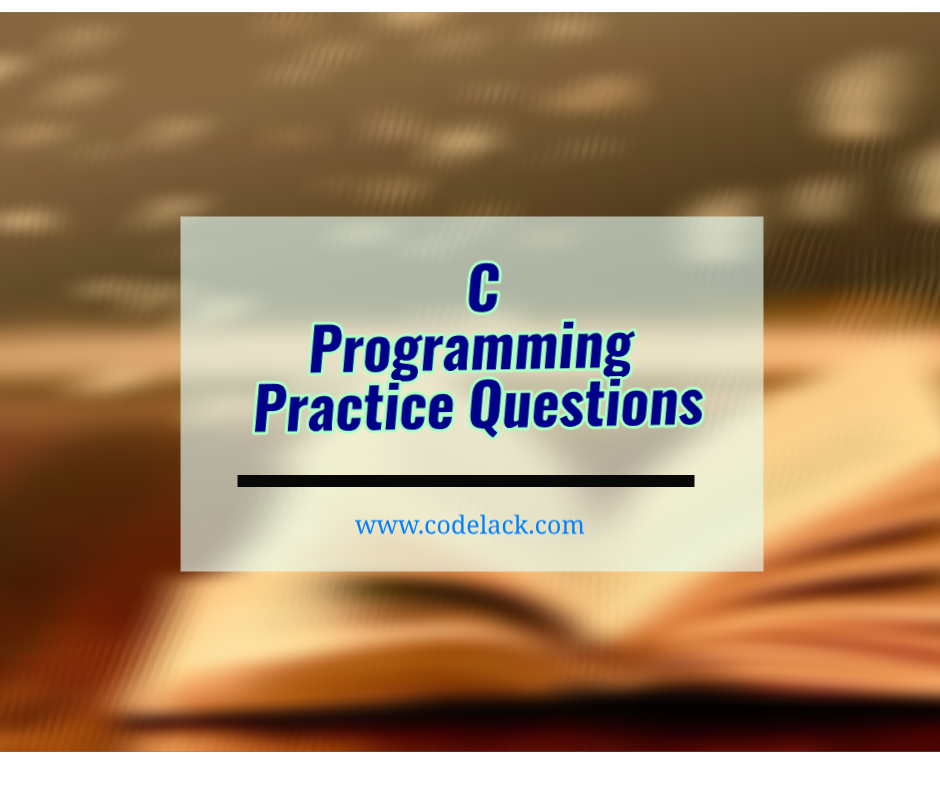c programming practice questions
1.
#include<stdio.h>
main()
{
int i;
for(i=0;i<5;i++)
{
static int a=0;
int b=0;
a++;
b++;
printf(“\na=%d”,a);
printf(“,b=%d”,b);
}
return 0;
}
Ans:
a=1
b=1
a=2
b=1
a=3
b=1
a=4
b=1
a=5
b=1
2.
#include<stdio.h>
main()
{
static int s;
++s;
printf(“\n%d”,s);
if(s<=3)
main();
printf(“\n%d”,s);
return 0;
}
Ans: 1 2 3 4 4 4 4 4
3.
#include<stdio.h>
extern int a;
main()
{
printf(“\na=%d”,a);
return 0;
}
Ans: Linking Error undefined symbol _a
4.
#include<stdio.h>
int a;
main()
{
printf(“\n a = %d”,a);
return 0;
}
Ans: a=0
5.
#include<stdio.h>
extern int a;
main()
{
printf(“\n a = %d”,a);
return 0;
}int a;
Ans: a=0
6.
#include<stdio.h>
extern int a;
main()
{
printf(“\n a = %d”,a);
return 0;
}
int a=5;
Ans: a=5
7.
#include<stdio.h>
extern int a=5;
main()
{
void fun();
printf(“\n a = %d”,a);
fun();
return 0;
}
int a;
void fun()
{
printf(“\n in fun a = %d”,a);
}
Ans: a=5,a=5
8.
#include<stdio.h>
extern int a;
main()
{
void fun();
printf(“\n a = %d”,a);
fun();
return 0;
}
int a=7;
void fun()
{
printf(“\n in fun a = %d”,a);
}
Ans: a=7,a=7
9.
#include<stdio.h>
extern int a=5;
main()
{
void fun();
printf(“\n a = %d”,a);
fun();
return 0;
}
int a;
void fun()
{
printf(“\n in fun a = %d”,a);
}
Ans: a=5,a=5
10.
#include<stdio.h>
void fun(int _)
{
printf(“%d”,_);
}
main()
{
fun(23);
return 0;
}
Ans: 23
11.
#include<stdio.h>
main()
{
auto a;
register r;
static s;
extern e;
printf(“\n%d”,sizeof a);
printf(“\n%d”,sizeof r);
printf(“\n%d”,sizeof s);
printf(“\n%d”,sizeof e);
return 0;
}
Ans: 2 2 2 2
#include<stdio.h>
void fun(auto int _)
{
printf(“%d”,_);
}
main()
{
fun(23);
return 0; }
Ans: Error
Identify the compiler error in the following code?
#include<stdio.h>
void fun(static int _)
{
printf(“%d”,_);
}
main()
{
fun(23);
return 0;
}
Ans: Error
Identify the compiler error in the following code?
#include<stdio.h>
void fun( extern int _)
{
printf(“%d”,_);
}
main()
{
fun(23);
return 0;
}
Ans: Error
Identify the compiler error in the following code?
#include<stdio.h>
void fun(register int _)
{
printf(“%d”,_);
}
main()
{
fun(23);
return 0;
}
Ans: 23
Identify the compiler error in the following code?
#include<stdio.h>
void fun(typedef int _)
{
printf(“%d”,_);
}
main()
{
fun(23);
return 0;
}
Ans: Error
Identify the error in the following code?
static extern
int a=5;
static int b = 6;
main()
{
printf(“\n%d”,a); printf(“\n%d”,b);
return 0;
}
Ans: 5 6
Identify the error in the following code?
#include<stdio.h>
main()
{
extern int a=5;
printf(“\n %d”,a);
return 0;
}
Ans: 5
Is it possible to declare static function in c language?
Ans: yes it become file scope function
Can we return more than one value by using return statement?
Ans: No
How to return more than one value from a function?
Ans: call by address
Can we use more than one return statement in one function?
Ans: yes
Give an example for function returning void but contains return statement?
Ans:
void abc()
{
printf(“Hello abc”);
return;
}
void main()
{
abc();
}
What is the differences between K&R C style and ANSI C style?
Ans:
K&R-C
int sum(a,b) int a; int b;
{
return (a+b);
}
ANSII-C
int sum(int a,int b)
{
return (a+b);
}
Write a small ‘c’ function to receive any number of arguments?
Ans: Argument list concept
What is the output of the following program?
main()
{
int *p1;
float *p2;
double *p3;
char *p4;
printf(“\n%u”,sizeof(p1));
printf(“\n%u”,sizeof(p2));
printf(“\n%u”,sizeof(p3));
printf(“\n%u”,sizeof(p4));
return 0;
}
Ans: 2 2 2 2
What is the output of the following program?
main()
{
int far *p1;
float far *p2;
double far *p3;
char far *p4;
printf(“\n%u”,sizeof(p1));
printf(“\n%u”,sizeof(p2));
printf(“\n%u”,sizeof(p3));
printf(“\n%u”,sizeof(p4));
return 0;
}
Ans: 4 4 4 4
What is the output of the following program?
main()
{
int *p;
int a=5;
*p++;
printf(“%d”,a);
return 0;
}
Ans: 5



